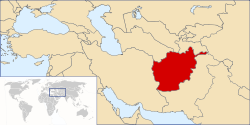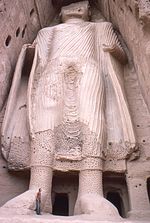- Republic of Afghanistan
-
For the present Islamic Republic of Afghanistan, see Afghanistan.
Republic of Afghanistan
د افغانستان جمهوریت← 
1973 - 1978
 →
→

Flag Coat of arms Capital Kabul Language(s) Pashto and Dari Religion Islam Government Single-party republic President - 1973–1978 Mohammed Daoud Khan Historical era Cold War - Established 1973 - Disestablished 1978 History of Afghanistan Timeline Bronze age and Proto-Elamite culture in Nimruz area (2300–1800 BC) Bronze age and Indus valley civilization in Mundigak (Kandahar area) (2200–1800 BC) Bronze age and Oxus civilization in northern Afghanistan (2100–1800 BC) Late Bronze age and Iron age and coming of Aryans (1700–700 BC) Median Empire (728–550 BC) Achaemenids (550–330 BC) Seleucids (330–150 BC) Mauryans (305–180 BC) Greco-Bactrians (256–125 BC) Indo-Greeks (180–130 BC) Indo-Scythians (Sakas) (155–80? BC) Indo-Parthians (20 BC–50? AD) Kushans (135 BC–248 AD) Sassanids (230–565) Indo-Sassanids (248–410) Kidarites (320–465) Hephthalites (410–557) Kabul Shahi (565–879) Rashidun Caliphate (642–641) Umayyads (661–750) Abbasids (750–821) Tahirids (821–873) Saffarids (863–900)) Samanids (875–999) Ghaznavids (963–1187) Seljukids (1037–1194) Khwarezmids (1077–1231) Ghorids (1149–1212) Ilkhanate (1258–1353) Kartids (1245–1381) Timurids (1370–1506) Arghun (1479-1522) Mughals (1501–1738) Safavids (1510–1709) Hotaki dynasty (1709–1738) Afsharids (1738–1747) Durrani Empire (1747–1826) Emirate of Afghanistan (1826–1919) Kingdom of Afghanistan (1919–1973) Republic of Afghanistan (1973–1978) Democratic Republic (1978–1992) Islamic State (1992–1996) Islamic Emirate (1996–2001) Islamic Republic (2001–) Afghan Civil War 1979–1989 1989–1992 1992–1996 1996–2001 2001–present
Republic of Afghanistan (Pashto د افغانستان جمهوریت) was the official state government of Mohammed Daoud Khan from 1973 to 1978. Daoud Khan became Afghanistan's first President in 1973 after he deposed Mohammad Zahir Shah in a non-violent coup. Daoud was known for his progressive politics and attempts to modernise the country with help from the Soviet Union and the United States, among others.[1]
In 1978, a military coup known as The Saur Revolution took place with help from the People's Democratic Party of Afghanistan. Daoud and his entire family were assassinated during the coup in 1978. The Daoud Republic gave birth to the Democratic Republic of Afghanistan (1978–1992).[2]
Contents
History
Formation
In 1973, while Mohammed Zahir Shah was in Italy undergoing eye surgery as well as therapy for lumbago, his cousin and former Prime Minister Mohammed Daoud Khan staged a coup d'état and established a republican government. As a former prime minister, Daoud Khan had been forced to resign by Zahir Shah a decade earlier.[3] In the August following this coup, Zahir Shah abdicated rather than risk an all-out civil war.[3]
Political reforms
The same year former Prime Minister of Afghanistan, Mohammad Hashim Maiwandwal was arrested for plotting a coup against Daoud's new established government. It is unclear if the coup was made to seize the power from Daoud or from former king, Mohammed Zahir Shah. Maiwandwal was arrested and committed suicide in jail before his trial; widespread belief says he was tortured to death.[2]
After the coup President Mohammed Daoud Khan established his own political party, the National Revolutionary Party. This party became the sole focus of political activity in the country. The Loya jirga approved Daoud's new constitution establishing a presidential one party system of government in January, 1977. Any resistance or rebellion against the new regime was crushed or suppressed by the government.[2]
Rise of communism
Main article: People's Democratic Party of AfghanistanDuring Daoud's presidency, relations with the communist countries abroad, especially the Soviet Union and the Afghan communists in the country deteriorated. The Soviet Union saw Daoud's shift to a more western-friendly leadership as dangerous, since Daoud was trying to distance himself and Afghanistan from the Soviet Union. He removed and kicked out Soviet military and economic advisers. The Soviets saw Daoud as an "anti-communist" concept because of his new approach towards the People's Democratic Party of Afghanistan (PDPA) and criticizing Communist Cuba's role in the Non-aligned Movement.[2]
In 1976 Daoud established a seven year economic plan for the country. He started military training programs with India for example and started economic development talks with Iran. Daoud also turned his attention to the oil rich Middle Eastern nations such as Saudi Arabia, Iraq and Kuwait among others for financial assistance.[2]
Daoud had achieved little of what he had set out to accomplish in 1978. The Afghan economy hadn't made any real progress and the Afghan standard of living had not risen. Daoud had also garnered much criticism for his single party constitution in 1977 which alienated him from his political supporters. By this time the Parcham and Khalq faction in the PDPA had reached a fragile agreement on reunification. At this time Communist army officials were planning a military coup against Daoud's government. According to second President of the Democratic Republic of Afghanistan, Hafizullah Amin, the PDPA had started plotting the coup in 1976 two years before the Saur Revolution.[2]
The Saur Revolution
Main article: The Saur RevolutionDay after Saur revolution in Kabul.
On April 27, 1978 the military-communist coup started. The coup started with military troops from the military base at Kabul International Airport starting to move towards the center of the city. It took only 24 hours to consolidate power in the capital. Daoud and most of his family was executed in the presidential palace in Kabul the following day.[4]
The PDPA seized power in a military coup in 1978 which is best known as the Saur Revolution.[5] Nur Muhammad Taraki, Secretary General of the PDPA, became President of the Revolutionary Council and Prime Minister of the newly established Democratic Republic of Afghanistan.[4] After the military coup, Taraki assumed the position as President of Afghanistan and Hafizullah Amin assuming the position as Deputy Prime Minister of Afghanistan.[6]
References
- ^ Rubin, Barnett. "DĀWŪD KHAN". In Ehsan Yarshater. Encyclopædia Iranica (Online Edition ed.). United States: Columbia University. http://www.iranica.com/newsite/articles/v7f2/v7f246.html. Retrieved January 2008.
- ^ a b c d e f "Daoud's Republic, July 1973 - April 1978". Country Studies. http://countrystudies.us/afghanistan/28.htm. Retrieved 2009-03-15.
- ^ a b Barry Bearak (23 July 2007). "Former King of Afghanistan Dies at 92". The New York Times. http://www.nytimes.com/2007/07/23/world/asia/23cnd-shah.html. Retrieved 2009-03-19.
- ^ a b Garthoff, Raymond L. Détente and Confrontation. Washington D.C.: The Brookings Institute, 1994. p. 986.
- ^ "World: Analysis Afghanistan: 20 years of bloodshed". BBC News. 1998-04-26. http://news.bbc.co.uk/2/hi/south_asia/83854.stm. Retrieved 2009-03-15.
- ^ "The April 1978 Coup d'etat and the Democratic Republic of Afghanistan". Library of Congress Country Studies. http://lcweb2.loc.gov/cgi-bin/query/r?frd/cstdy:@field(DOCID+af0087). Retrieved 2009-03-19.
External links
Heads of state of Afghanistan since 1709  Hotaki Empire
Hotaki Empire Durrani Empire
Durrani Empire Emirate of Afghanistan
Emirate of Afghanistan
(Barakzai dynasty) Kingdom of Afghanistan
Kingdom of Afghanistan
(Barakzai dynasty) Republic of Afghanistan
Republic of Afghanistan Democratic Republic of Afghanistan
Democratic Republic of Afghanistan
(Khalq) Democratic Republic of Afghanistan
Democratic Republic of Afghanistan
(Parcham) Republic of Afghanistan
Republic of Afghanistan Islamic State of Afghanistan
Islamic State of Afghanistan Islamic Emirate of Afghanistan
Islamic Emirate of Afghanistan Islamic Republic of Afghanistan
Islamic Republic of AfghanistanMonarchs of Afghanistan · Presidents of Afghanistan Categories:- Former countries in South Asia
- States and territories established in 1973
- States and territories disestablished in 1978
- Former countries in the Middle East
- Former countries in Central Asia
- 1978 disestablishments
- History of Afghanistan
Wikimedia Foundation. 2010.



